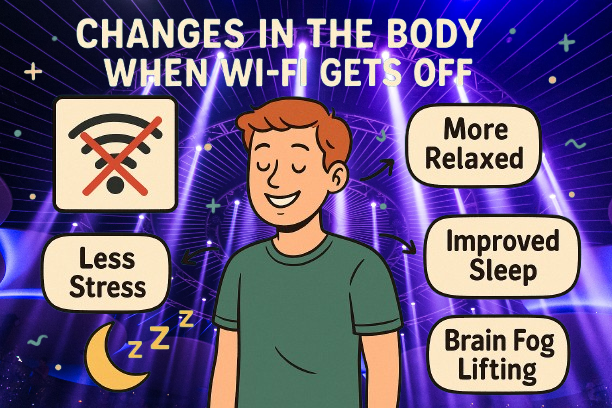Changes in the body when Wi-Fi gets off : We know Wi-Fi technology is much more advanced than any other previous Wi-Fi technology. This is why Wi-Fi technology finds application in all modern devices. Various opinions have been given by different scientists at different times that a Wi-Fi router causes various complex diseases and even causes a menace of cancers. The World Health Organization (WHO), a few months ago, had said that if the Wi-Fi router is kept running all night near one's head, the risk of cancer or brain tumors may increase due to electromagnetic waves entering into the body.
But,<NIH>according</NIH> to the information of the National Institute of Health (NIH) of this country, the frequency of waves emitted from a Wi-Fi router is very low, and it cannot be that harmful to the body.But if your Wi-Fi router is very close to your head while asleep, disturbances in sleep can occur. Wi-Fi on, prongs on your head, causing insomnia, headaches, or migraines, remarked neurologist Animesh Kar. Wi-Fi waves, it is said, are 'non-ionizing' by him. Generally, the waves emit frequencies in between 2.4 and 5 GHz predominantly from a WiFi router. The said frequency will not be far-reaching to even think about major damage to the body. Cancer Research Center of Britain has also said the same. There is no chance of cancer from WiFi.
Advantages:
1) WiFi router can connect several machines simultaneously.
2) Because of very high speed, WiFi is becoming more popular among people day-by-day.
3) Connect to the Internet from any location (depending on your router's signal).
4) WiFi is the famous Internet connection for business organizations.
5) WiFi can be used without structured cabling Internet connection.
6) WiFi is very fast and easy. It does not require technical knowledge of the WiFi system and its protocols.
7) With affordable prices, you can get WiFi from TP-Link, D-Link, Tenda, etc.
8) WiFi can be used on several types of devices such as: smartphones, tablet devices, and other portable devices.
9) Internet is accessible anywhere. Bus, train, coffee shop, supermarket, etc.
10) Network can be extended placing a Wi-Fi extender.
Disadvantages of WiFi :
1) Data transfer rates decrease as the number of users or computers connected to a WiFi network increases.
2) WiFi routers use different encryption methods to encrypt our network passwords. Theoretically, your WiFi password may be hacked.
3) WiFi access is available only within 30 to 100 meters (i.e., 100 to 300 feet).
4) The maximum number of devices that could be connected at any time is 30 for many routers. So, the bandwidth will decrease with more devices connecting to the WiFi network.
5) WiFi is believed to cause health damage, such as cancer, insomnia, apoptosis, and one that tells pregnant women to stay away from WiFi radiation.
6) The secret exploitation of unprotected networks to steal information or committing offences is another disadvantage.
How harmful WiFi is to the body: Dr. Hiran S. Reddy, Consultant Physician and Diabetologist at Gleneagles Hospital, Hyderabad, stated, "The radiation emitted from WiFi routers is very low and is of the non-ionizing type, which is generally not harmful to the human body, at least this is what is currently believed by scientists" . Thus even for a mere seven days of keeping the router off at night, there is very little chance of any major change happening in the body.
However, for the fellow who feels that he or she is sensitive to electromagnetic fields, some of these symptoms such as headaches, sleep disturbances, or mental fatigue could be alleviated. But there is not yet enough scientific evidence for this entity called 'electromagnetic hypersensitivity.'
Wi-Fi has both many advantages and disadvantages. However, due to its many advantages, this technology is currently becoming more popular. With time, the number of Wi-Fi users is also increasing and it can be estimated that the use of Wi-Fi will increase more widely in the near future.
FAQs:
1. Does turning off Wi-Fi improve my health?
There is no scientific evidence showing that turning off Wi-Fi directly improves physical health. However, it may help indirectly by reducing screen time, improving focus, or encouraging better sleep routines.
2. Can turning off Wi-Fi help me sleep better?
Possibly, but not because of the Wi-Fi signal itself. Sleep might improve due to fewer notifications, reduced device usage, and less blue light exposure—not because of Wi-Fi radiation.
3. Is Wi-Fi harmful to the human body?
No. Wi-Fi uses non-ionizing electromagnetic radiation, which does not damage DNA or cells. It's generally considered safe at normal exposure levels.
4. What is Electromagnetic Hypersensitivity (EHS)?
Some people report symptoms like headaches or fatigue when around EMF sources like Wi-Fi. However, scientific studies have not confirmed a consistent link, and symptoms often occur even when no EMF is present.
5. Can children be affected more by Wi-Fi signals?
Current scientific consensus is that Wi-Fi exposure is safe for children when within safety limits. Still, limiting screen time is a good idea for their development and sleep, which sometimes happens when Wi-Fi is off.

